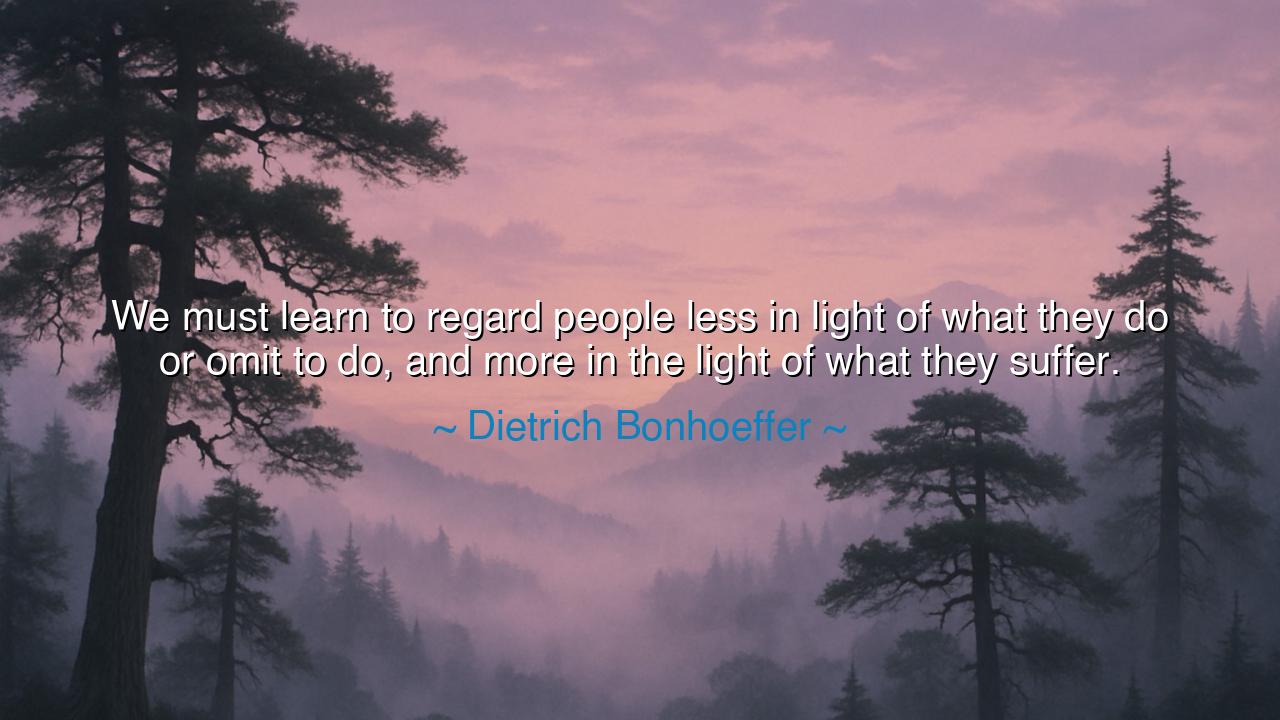
We must learn to regard people less in light of what they do or
We must learn to regard people less in light of what they do or omit to do, and more in the light of what they suffer.






Hearken, O seekers of compassion and the understanding of the human heart, to the words of Dietrich Bonhoeffer, the sage of conscience and courage: "We must learn to regard people less in light of what they do or omit to do, and more in the light of what they suffer." In this utterance lies the ancient truth that the measure of a soul is found not merely in action or inaction, but in the burdens, trials, and suffering that shape the inner life. To see with empathy is to perceive the hidden struggles that guide behavior and mold character.
In the theater of existence, many judge one another by deeds alone, overlooking the unseen pain and hardship that influence every choice. Bonhoeffer illuminates that mercy, understanding, and true wisdom arise when one perceives the suffering that lies beneath action and omission. To regard the heart of another through the lens of affliction is to honor the depth of human experience and to cultivate empathy beyond superficial measure.
The ancients, who chronicled the lives of heroes, sages, and the common folk alike, understood that suffering is the forge of virtue and the shadow in which character is revealed. A deed may appear small, flawed, or insufficient, yet beneath it may lie struggle, courage, or sacrifice unknown to the observer. To judge solely by surface actions is to miss the essence, for the soul’s trials often remain invisible, yet their influence is profound.
Yet this teaching carries subtle wisdom: to perceive suffering is not to excuse wrongdoing, but to illuminate the complexity of human nature. Bonhoeffer urges the seeker to balance discernment with compassion, understanding with justice, and evaluation with mercy. By acknowledging what others endure, one cultivates patience, tolerance, and the capacity to act with humanity.
Therefore, O children of empathy and discernment, let this teaching lodge in your hearts: regard not only what people do or fail to do, but perceive the weight of their suffering. In this vision, one sees the fullness of human existence, honors the struggles that shape character, and nurtures the sacred art of compassion. By embracing this truth, the soul walks in the wisdom of the ancients, perceiving others as fellow travelers on the arduous journey of life.






MDPhan Minh Duc
This quote speaks to the importance of compassion in understanding human behavior. It suggests that suffering can drive actions that might otherwise be misunderstood. But how do we know when someone’s suffering is truly influencing their actions, and when it's just an excuse? Can we be more compassionate without being overly permissive, and how do we draw that line?
TGTra Giang
Bonhoeffer’s words challenge us to reconsider how we judge others. Instead of pointing fingers at what they do or fail to do, we are encouraged to think about what they might be going through internally. Does this mean we should excuse poor behavior if it’s caused by suffering, or is there a balance between compassion and accountability? How do we show empathy without enabling unhealthy behaviors?
TTnguyen thi thao
I find this quote deeply moving. It's easy to criticize or form opinions about someone based on what they do, but this reminds us that we don’t always know the full picture. How much could our relationships improve if we took the time to understand what others are suffering, rather than focusing solely on their actions? What would it mean to look beyond the surface?
SLSon Le
This quote really makes me think about the way we often judge people by their actions, without considering the underlying struggles they might be facing. It reminds me that there’s more to someone than just their behavior. How often do we pause to understand the pain or challenges that might be influencing their actions? Could empathy and understanding transform the way we interact with others?